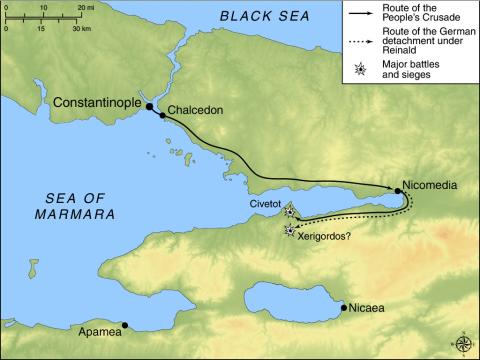The People's Crusade
[1.2.6] Illī vērō quī ēvādere potuērunt Cyvītō fūgērunt; aliī praecipitābant sē in mare, aliī latēbant in silvīs et montānīs. Turcī vērō, persequentēs illōs in castrum, adūnāvērunt ligna, ut eōs combūrerent cum castrō. Chrīstiānī igitur quī in castrō erant mīsērunt ignem in ligna congregāta, et versus ignis in Turcōs quōsdam eōrum concremāvit, sed ab illō incendiō Deus nostrōs tunc līberāvit. Tandem Turcī apprehendērunt illōs vīvōs, dīvīsēruntque illōs sīcut prius fēcerant aliōs, et dispersērunt illōs per ūniversās regiōnēs hās, aliōs in Chorosānum, aliōs in Persidem. Hoc tōtum est factum in mēnse Octōbrī. Audiēns imperātor quod Turcī sīc dissipāssent nostrōs, gāvīsus est valdē, et mandāvit fēcitque eōs Brāchium trānsmeāre. Postquam ultrā fuērunt, comparāvit omnia arma eōrum.
notes
(October 1096) Many of the crusaders escape to the fort at Civitot/Helenopolis. The Turks try to burn them out, but fail, and the crusaders surrender. The emperor, says our author, was happy about this defeat; he rescued the survivors, but he had them disarmed.
Cyvītō: ML can use a dative for place to which; CL prose would be accusative.
persequentēs: CL (rarely) and ML (frequently) use the present (act.) participle as though it were a perfect, since except for deponent verbs there is no perfect active participle.
sed: = et.
Audiēns imperātor quod Turcī sīc dissipāssent nostrōs, gāvīsus est valdē, et mandāvit fēcitque eōs Brāchium trānsmeāre: We have to infer that there were some survivors of the defeat, who made it back to Constantinople.
ultrā: i.e., on the other (western) side of the Hellespont.
vocabulary
adūnō (1): to make one, unite (LL); put together (ML)
vertō (3): to turn
dissipō (1): to shatter, destroy completely
gaudeō gaudēre gāvīsus: to rejoice
comparō (1): to collect (OLD 3b)

